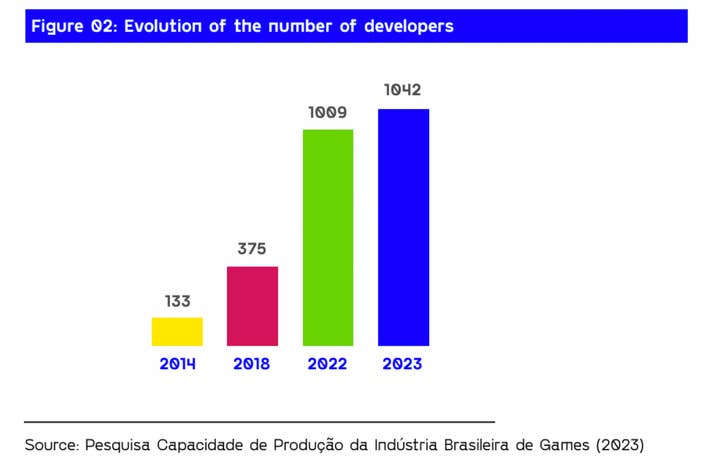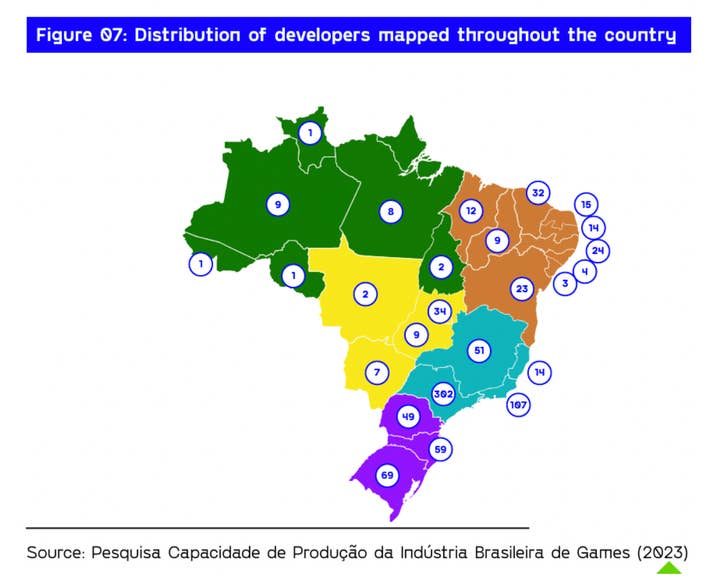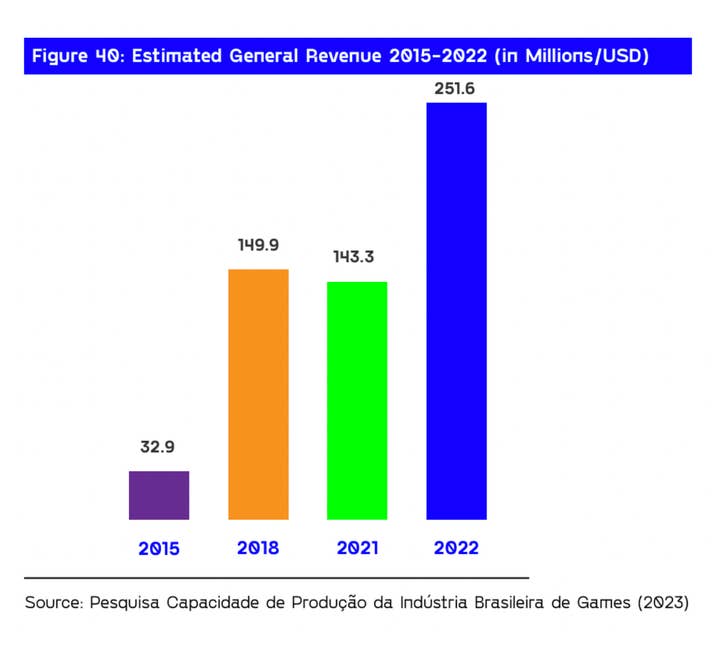The Brazilian gaming industry by the numbers
As part of our Brazil Games Week initiative, we aim to deliver a detailed perspective on the gaming scene in Brazil.
James Batchelor of GamesIndustry.biz journeyed to Brazil to gather insights on the market, its hurdles, and prospects directly from industry insiders.
Here, we explore the statistics that define Brazil's gaming sector, along with insights into the marketplace and its consumers.
Data comes from the second national survey of the games industry conducted by the Brazilian Association of Digital Game Developers (Abragames) and ApexBrasil, based on 2022 data and updates from 2023 by GA Consulting.
A total of 343 companies participated in the Game Brasil Survey, covering about one-third of Brazilian studios.
Compared to past data, recent findings reveal notable advances in the Brazilian games industry.
The Brazilian games industry

The Brazilian gaming sector mainly consists of micro and small studios, totaling 1,042 developers. From 2020 to 2022, 2,600 games originated in Brazil, with 1,009 alone in 2022, marking a 12% annual growth.
Since the initial survey in 2014, the increase has been substantial, starting from 133 studios to 375 in 2018, reaching a 177% surge by 2023.
By last year, 13,225 individuals were employed in the Brazilian games field, a rise of 6.3% from 2022's 12,441.
Men form the majority of the workforce at 74.2%, while women's participation fell from 29.8% in 2022 to 24.3% in 2023. The percentage of non-binary workers held constant at 1.5%.
The decrease in female workforce might be attributed to differing samples from each survey year, as noted in the report.
A significant 93% of surveyed Brazilian developers focus on creating their intellectual properties.
According to Abragames' president Rodrigo Terra, local projects now compete globally. Though investment gaps exist, they are not due to capability concerns. The years between 2021 and 2022 saw national studios emphasize transmedia projects (15%) and more frequently license their IPs (13%) than engage with third-party licensing, which was once 18% in 2021.
Studio distribution highlights Sao Paulo (302 studios), followed by Rio de Janeiro (107), and Rio Grande do Sul (69).

About 70% of game studios in Brazil operate remotely, with 16% adopting a hybrid approach, and 14% working from offices.
Unity is the technology of choice for 80% of developers, with Unreal Engine being used by 25%, indicating some overlap in usage.
The Brazilian games market

In 2023, the Brazilian game development industry achieved estimated revenues of USD $251.6 million.
Mobile games lead the market with a share of 51.7%, trailed by console games at 20.5% and PC games at 19.4%. Notably, consoles surpassed PCs between 2022 and 2023, while the mobile segment saw a 3.4% increase.
When it comes to game development within Brazil, only 24% target the mobile platform, slightly less than PC titles at 24.9%. Web browser games follow at 23%, with consoles at 11%.
The share of digital sales has grown from 54% in 2021 to 62% in 2023.
Entertainment games dominate Brazilian production at 83%, with educational titles at 8% and advergames at 3%.
Many Brazilian studios offer services to international developers, with the United States and Latin America being key partners, while Western Europe shows steady growth, engaging 54% of studios compared to 49% in previous years.
Roughly 50% of studios doing international business derive over 70% of their revenue from global markets.
The Brazilian audience
Brazil stands as Latin America's largest gaming market and ranks fifth worldwide based on its online population, boasting approximately 103 million gamers.
The Game Brasil Survey indicates that playing video games is a primary entertainment activity for 82.1% of Brazilians.
Women account for 46.2% of Brazil's gamer demographic, while men make up 53.8%.
Gamers range across all age groups, with majority between 19 and 44 years old. Players aged 25 to 29 represent the largest group at 16.2%, followed by those between 30 and 34 at 16.1%.
The segment of players over 50 has slightly increased, now constituting 8.5% of the player base.
The racial composition shows 42.2% identifying as white, 41.4% as mixed race—a noticeable 4.1% rise annually—and 12.7% as Black.
Optimism is high for Brazil's gaming future, says Rodrigo Terra: "As companies adjust post-pandemic, the Brazilian economy appears poised for improvement, despite global uncertainties. We anticipate a future filled with challenges and opportunities for Brazil to extend its growing and diversifying ecosystem."
